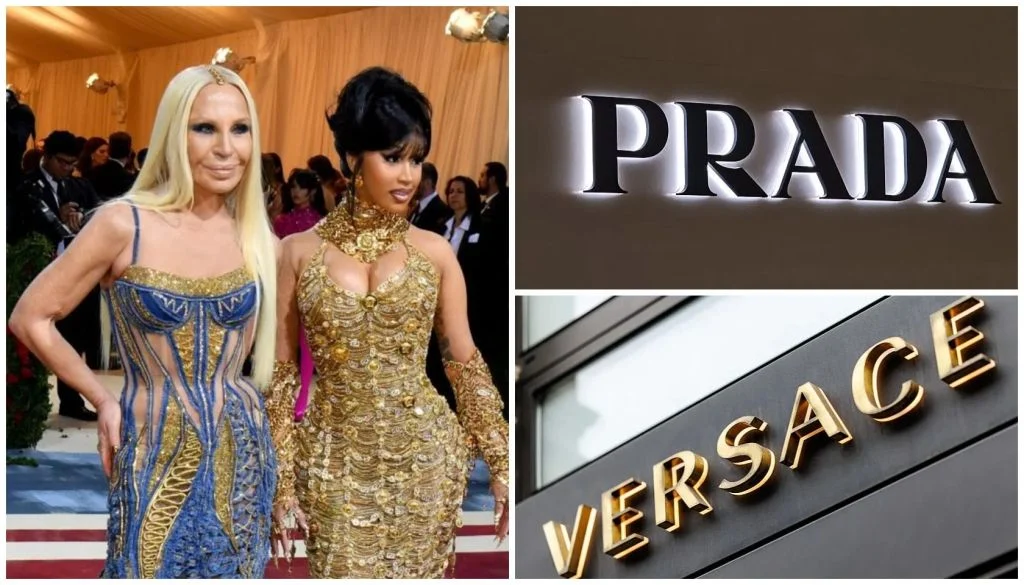tech
Page: 12
HipHopWired Featured Video
Play Company / 2K
Play Company and 2K are partnering to give NBA 2K players another way to take on each other and back up all the trash-talking using a new dedicated tournament system.
The new, groundbreaking multi-year partnership announced last week allows NBA 2K players to win monetary prizes through online tournaments, giving them the ability to truly put their money where their mouth is, if they are as skilled in NBA 2K as they claim to be.
The new tournament system, called Play NBA 2K, will be integrated within The Play Company’s flagship product, Play OS. The deal also makes Play OS the official tournament platform for the game. It will introduce a dedicated menu button in the NBA 2K25 Play Now section for eligible players, allowing them to learn how to gain access to NBA 2K tournaments.
Through Play NBA 2K, players can participate in free-to-enter tournaments and entry-fee-based tournaments, providing NBA 2K fans with even more opportunities to compete in the basketball video game.
“Unlocking the ability for NBA 2K players to earn real cash prizes through competitive play marks a major milestone for us and the industry. We’re incredibly grateful to the team at 2K for helping make this transformative partnership a reality,” said The Play Company CEO, Brandon Pitts.
“2K’s partnership with The Play Company will further expand the ways that we are trying to build engagement and connect with our players,” said 2 K’s head of lifestyle and content marketing Ronnie “Ronnie 2K” Singh. “For us the deal with The Play Company serves as yet another way to quench the thirst of our competitive 2K community,” Singh said.
The service will go live with Play Now and MyTEAM tournaments. Additional tournament formats will be rolling out in the months ahead. Gamers can join Tournaments by downloading the Play OS mobile app on iOS or visiting this website.
NBA 2K Continues To Find Ways To Keep Players Engaged
NBA 2K remains at the forefront, allowing its players to enhance their gameplay experience and earn money. There the NBA 2K League that partners with the NBA, allowing those who are exceptionally good at the game to make a living playing 2K and be treated like actual athletes and there was the players only tournament that took place during the pandemic featuring some the league’s biggest stars who are also good at NBA 2K.
We are intrigued to see how successful this new partnership will be.
HipHopWired Featured Video
Nintendo / Nintendo Switch 2
Mark your calendars, U.S. Nintendo fans, you can now officially preorder your Switch 2 on April 24.
Nintendo announced the new preorder date for U.S. customers and revealed that the price for the Switch will also remain at $449.99 for the base console and $499.99 for the Mario Kart World bundle.
Prices for both physical and digital versions of Mario Kart World ($79.99) and Donkey Kong Bananza ($69.99) will remain unchanged.
However, there is some bad news: the price of Nintendo Switch 2 accessories is going up. The Switch 2 Joy-Con, Switch 2 Pro Controller, and Switch 2 Camera are seeing price bumps.
The Joy-Con 2, originally priced at $89.99, will now be priced at $94.99. The Pro Controller increased from $79.99 to $84.99, and the Nintendo Switch 2 Camera rose from $49.99 to $54.99.
Gamers who usually use video games as an escape from politics are now seeing how politics can invade their space.
All of these moves by Nintendo are a direct result of Donald Trump’s abuse of tariffs. Originally, preorders for the Switch 2 were supposed to begin on April 9, but were delayed after Orange Mussolini announced his tariffs, which would affect everyone, including an island inhabited by penguins and seals.
In response to his boneheaded actions, Nintendo said it was delaying Switch 2 preorders in the U.S. “to assess the potential impact of tariffs and evolving market conditions,” but also stated that the June 5 release date remains unchanged.
How We Got Here
On April 8, Nintendo also delayed preorders for the Switch 2 in Canada “in order to align with the timing of preorders to be determined in the US.”
After watching the global economy tank and the U.S. stock market nosedive for a few days, Trump issued a 90-day pause on some of the tariffs, but kept the 145 percent tariff on China in place.
Then, news broke that the Trump administration had announced exemptions for smartphones, computers, and chips. Unfortunately, gaming consoles were not on the list, but then Trump said that “no one is getting off the hook.”
In anticipation of Trump’s tariffs, Nintendo began stockpiling the Switch 2 in the United States and shifted most of its non-Chinese production there.
The Switch 2’s announcement has been a clusterf***, with some issues being on Nintendo’s part, but mainly due to the company trying to navigate Trump’s erratic behavior with the tariffs.
Let’s hope this date stands firm, and people won’t have to choose between putting food on the table or getting a Switch 2 at this point.
HipHopWired Featured Video
Ben Montgomery
Shein and Temu shoppers in the US, we have some bad news for you: yesterday’s price will not be today’s price beginning next week when the two Chinese-based companies raise their prices.
Spotted on The Verge, the two “ultra-cheap” retailers sent a letter to customers warning them of price adjustments due to Donald Trump’s abuse of tariffs.
Orange Mussolini has been on a roll when it comes to making our lives miserable, wrecking the global economy, while sending the US stock market into a free fall when he walked out into the White House rose garden and announced a bunch of “reciprocal” tariffs on what he called “liberation day.”
While he has since paused most of the tariffs, he raised tariffs on goods imported from China to 145 percent, with his brain-dead administration claiming that tariffs on other imports, such as electric vehicles, could hit 245 percent when added to existing tariffs.
To make matters worse for both companies, the US announced it would be eliminating the de minimis exception, which allowed goods valued under $800 to avoid tariffs. As you would expect, Shein and Temu both benefited from the exception for years.
After May 2, you can expect prices to increase on the affordable toys, clothing, and home goods that companies sell.
“Until April 25, prices will stay the same, so you can shop now at today’s rates,” Shein and Temu said to shoppers on their websites. “We’re doing everything we can to keep prices low and minimize the impact on you.”
Bruh, Donald Trump can kick rocks.

HipHopWired Featured Video
CLOSE
Source: Sprayground / Destiny 2
Sprayground, the popular brand best known for its collectible backpacks and luggage, is back with another fire collaboration. Fans of Bungie’s shooter, Destiny 2, definitely need this in their collection.
The limited Destiny 2 collection from Sprayground will feature two eye-catching backpacks that have become a staple among street style enthusiasts and young kids.
This latest collection celebrates Guardians, Ghosts, and lunar frontiers, all found in Destiny 2, with two amazing backpacks.
“Destiny has cultivated a passionate global community, and we wanted to craft something that truly resonates with the players,” said David BenDavid, Founder and Chief Creative Director of Sprayground. “These backpacks are more than just accessories – they’re a tribute to the game’s lore, visuals, and those who embrace the adventure.”
Source: Sprayground / Destiny 2
The first backpack is inspired by the Guardians’ floating companions, the Ghosts, which also guide the Lightbearers on their mission to protect the Last City and the solar system from the Witness, Fallen, Hive, Vex, Cabal, Taken, and various other threats.
Dubbed the Destiny Ghost Buddy Backpack ($120), it features a plush Ghost on the backpack along with other intricate detailing to help it truly stand out from other backpacks.
Source: Sprayground / Destiny 2
Next, the Destiny First Light Backpack ($90) draws inspiration from the First Light Lunar Installation, one of the first locations the Guardians explored in the Destiny franchise.
It incorporates the facility’s distinctive logo with 曙光 (shǔguāng), meaning “Dawn” or “First Light,” delivering fans another magnificent backpack that is a must-have.
Source: Sprayground / Destiny 2
How To Get One of The Destiny 2 Backpacks
Both backpacks are currently on sale via Spraygrounds’ website and select retailers, featuring staple features such as a spacious laptop compartment, a plush velour pouch for valuables, and Sprayground’s signature hidden pockets.
Hit the gallery below for more photos.
1. Sprayground x Destiny 2
Source:Destiny 2
Sprayground x Destiny 2 destiny 2,sprayground
2. Sprayground x Destiny 2
Source:Destiny 2
Sprayground x Destiny 2 destiny 2,sprayground
3. Sprayground x Destiny 2
Source:Destiny 2
Sprayground x Destiny 2 destiny 2,sprayground
4. Sprayground x Destiny 2
Source:Destiny 2
Sprayground x Destiny 2 destiny 2,sprayground
5. Sprayground x Destiny 2
Source:Destiny 2
Sprayground x Destiny 2 destiny 2,sprayground
6. Sprayground x Destiny 2
Source:Destiny 2
Sprayground x Destiny 2 destiny 2,sprayground
7. Sprayground x Destiny 2
Source:Destiny 2
Sprayground x Destiny 2 destiny 2,sprayground
All products and services featured are independently chosen by editors. However, Billboard may receive a commission on orders placed through its retail links, and the retailer may receive certain auditable data for accounting purposes.
When looking for new home theater gear, it can be difficult to find the best digital projector that delivers amazing picture and audio quality. However, we found a top-rated smart home theater projector — and it’s very affordable.
Explore
Explore
See latest videos, charts and news
See latest videos, charts and news
Available at Walmart, the RCA HD Roku Smart Home Theater Projector is priced at just $88, while it has a 4.5 out of 5-star rating from the retailer’s shoppers. It features Roku inside for video streaming movies and TV shows from popular apps, including Netflix, Apple TV+, Hulu, Sling TV, Max, Paramount+, Peacock, BET+, Prime Video, Disney+ and others. You can even stream your favorite music and podcasts with Spotify, Apple Music, Amazon Music, Tidal and more.
And since the RCA HD Roku Smart Home Theater Projector is from Walmart, you’ll get it shipped to you for free if you’re a Walmart+ member. Otherwise, your cart has to be more than $35 to get free shipping.
If you’re not a member, then you’re in luck: You can sign up for a 30-day free trial to take advantage of everything the retailer’s rewards program has to offer with perks such as free, fast delivery; fuel discounts; streaming access to Paramount+ to watch hit originals; additional savings with early access deals and much more.
In addition, Walmart+ comes with access to SiriusXM for all sorts of talk radio and music — including popular channels like “The Coffee House” for stripped-down songs from Noah Kahan, Kacey Musgraves, The Lumineers, Phoebe Bridgers and others. Learn more about what Walmart+ can offer you here.
RCA
RCA HD Roku Smart Home Theater Projector
Meanwhile, the smart home projector has 150 lumens of brightness for clear and sharp HD picture quality with a projection size up to 180 inches. That’s up to 15 feet in height! It also has Bluetooth built-in to connect your smartphone or tablet for even more streaming options. You can connect extra speakers for immersive surround sound when you’re watching movies.
Priced at just $88, the RCA HD Roku Smart Home Theater Projector at Walmart.
Want more? For more product recommendations, check out our roundups of the best Xbox deals, studio headphones and Nintendo Switch accessories.
HipHopWired Featured Video
Ubisoft / Assassin’s Creed Shadows
For the lames out there wishing Assassin’s Creed Shadows would flop, this news will not sit well with you.
Ubisoft has already been proudly announcing that Assassin’s Creed Shadows has been a massive win for the company despite all the hate, numerous delays, and made-up controversy that encircled the game well before its release.
A closer look at the sales data shows that the latest entry in the iconic Assassin’s Creed video game franchise accomplished some monumental sales feats.
According to Mat Piscatella, Executive Director at Circana, Assassin’s Creed Shadows was the best-selling game in the United States for each of the first three weeks following its release, per Circana’s tracking data, which is accurate up to April 5.
Only one other game has sold more at that’s Capcom’s latest hit, Monster Hunter Wilds, which continues to do numbers. Ubisoft has yet to comment about Shadows sales accomplishments, but the game publisher did toot its own horn, announcing the AC Shadows 3 million player count on March 27.
Shadows’ success is the win Ubisoft needed after Star Wars Outlaws‘ disappointing showing. We don’t know exactly how many players are still playing AC Shadows or how many copies were sold because Ubisoft remains mum, but we expect them to announce those details soon.
The Critics Remain Positive On Assassin’s Creed Shadows
Assassin’s Creed Shadows is currently at a strong 81 on OpenCritic, with 82% of reviewers recommending the game and a very good 90% player rating.
We were one of the critics high on the game writing in our review:
Assassin’s Creed Shadows is an exceptional entry into the franchise that brilliantly combines all of the good features from the games over the years and stuffed them into a game that doesn’t require you to play 100+ hours to complete. It’s so good that you want to spend as much time in its world as possible to uncover more of the story because it’s absolutely worth it.
Congrats to the Ubisoft Quebec team on the win, and a nice hidden blade to haters who said the game was going to flop because it was “woke.”
HipHopWired Featured Video
Nintendo / Nintendo Switch 2 / Getty Images / Donald Trump
Donald Trump’s stupid trade war and his blatant abuse of tariffs continue, showing no clear indication this madness will end.
Orange Mussolini said aht aht aht after numerous reports claiming he was gonna exempt smartphones, PCs, and chips from his sweeping tariffs.
Spotted on Eurogamer, Donald Trump has backtracked on those exemptions, saying “no one is getting off the hook” and “there was no Tariff ‘exception” on his Truth social account. This kills all hope of anyone avoiding the absurd 145 percent tariff he slapped on China.
There is also a separate tariff specifically for semiconductors coming as well.
Per Eurogamer:
Chinese electrical goods would simply now be placed in “a different tariff bucket”, Trump continued, concluding that National Security Tarriff Investigations would be reviewing “the WHOLE ELECTRONICS SUPPLY CHAIN”.
US commerce secretary Howard Lutnick has told ABC News that a separate “semiconductor tariff” was now planned – exact details of which are yet to be determined.
“We need to have semiconductors, we need to have chips, and we need to have flat panels, we need to have these things made in America,” Lutnick said. “We can’t be reliant on Southeast Asia for all of the things that operate for us.”
Speaking to CBS News, US trade representative Jamieson Greer confirmed this semiconductor tariff meant Chinese electrical goods had therefore been given something that was “not really an exception. That’s not even the right word for it.”
“It’s not that they won’t be subject to tariffs geared at reshoring,” Greer continued. “They’ll just be under a different regime. It’s shifting from one bucket of tariffs to a different bucket of potential tariffs.”
There is no clear plan for anything this Trump administration does; there is no exact date on when the Trump administration will introduce the semiconductor tariff or how much it will be.
The Gaming Industry Has Begun Prepping For Trump’s Tariffs
The video game world has been prepping and making moves ahead and after Trump’s “Liberation Day.”
Nintendo has already delayed Nintendo Switch 2 preorders in the US indefinitely, begun stockpiling the console in the country, and shifted most of its non-Chinese output there.
Nintendo is not alone. Sony just recently announced it was raising the price of the PlayStation 5’s digital edition in the UK, mainland Europe, Australia, and New Zealand.
The company said the “tough decision” was a result of “the backdrop of a challenging economic environment, including high inflation and fluctuating exchange rates.”
This nightmare has no end in sight.
HipHopWired Featured Video
Bowers & Wilkins, a notable audio products brand that has been in existence since the 1960s, produces some of the finest loudspeakers and Bluetooth audio products in the world. After recently announcing a partnership with the British motorsports team McLaren, Bowers & Wilkins has released the new Pi8 McLaren Edition Bluetooth headphones.
We’ve experienced Bowers & Wilkins’ excellent Pi5 and Pi7 S2 in-ear Bluetooth headphones, and we can state firmly that the hardware lives up to the hype. By way of its solid construction, world-class audio, and exceptional all-day comfort, coupled with strong battery life, we’re excited to share the news of the brand’s Pi8 McLaren headphones.
The McLaren Pi8 is equipped with two 12 mm Carbon Cone drivers, offers 24-bit audio connection, 5-band customisable EQ + TrueSound™ mode, Bluetooth 5.4 with aptX™ Lossless technology, and Active Noise Cancellation (ANC), a feature that is standard across all the in-ear products we’ve tried from the Bowers & Wilkins brand.
Back in March, Bowers & Wilkins and the McLaren Automotive team announced that B&WW is the Official Audio Partner for McLaren, with hopes of bringing fans of F1 racing into the high-end audio space. We can certainly say without a doubt that from the images, this will be an especially head-turning set of headphones with their Papaya orange and Galvanic Grey color stylings, and the amazing functionality will certainly spark some folks to hop aboard and get into all the offerings put out by Bowers & Wilkins.
Giles Pocock, Vice President of Brand Marketing for Bowers & Wilkins, shared in a statement, “We are thrilled to collaborate with the McLaren team once again. This reimagining of our award-winning earbuds elevates our long-term partnership even further by combining the unmistakable design DNA of McLaren with our industry-leading audio products to create an attention-grabbing version of our Pi8. We’re excited to see how it’s received by Bowers & Wilkins and McLaren fans alike.”
We hope to get our hands on the Pi8 McLaren Edition headphones very soon, and the product is currently not on the market after a brief pre-sale event earlier this month, but it will be dropping very soon. Click here to learn all the nuts and bolts about this exciting release from Bowers & Wilkins.
Click here to learn more about the brand in full.
—
Photo: Bowers & Wilkins

HipHopWired Featured Video
CLOSE
Source: Bungie / Marathon
Bungie hopes to get back in the good graces of gamers following what many deem was a disappointing swan song for Destiny with its highly-anticipated extraction shooter Marathon. The verdict is still out after the reveal if Bungie accomplished that mission.
Finally, we know what Marathon is aiming for following the epic reveal in the form of a livestream event on Saturday. The game’s developers were understandably giddy and excited to show off the fruit of their labor, which some media and 40 creators had the opportunity to get their hands on during an alpha playtest.
In the gameplay highlights trailer, we feast our eyes on the lucky few getting hands-on with Bungie’s ambitious extraction shooter, and they looked like they were enjoying their time with Marathon.
As for the game itself, players will take control of “Runners,” cybernetic mercenaries with unique abilities. Unfortunately, you can’t create your Runner, but you can customize their playstyle with the weapons, implants, and equipment you collect on your runs.
Source: Bungie / Marathon
The action takes place in the lost colony of Tau Ceti IV, where its inhabitants disappear without a trace, and rival factions hire Runners to loot the colony. Runners will link up in teams of 3 on maps, allowing up to 18 players, so up to six teams, or if you’re bold enough, you can go a run alone to increase your take. You will take on rival teams, hostile security forces, and creatures as you search for rare loot and try to survive until it’s time to be extracted.
If you die, you loose your loot, it’s that simple.
How Much Will Marathon Cost?
Source: Bungie / Marathon
Bungie also announced the release date for Marathon: September 23 on PS5, Xbox Series S / X, and PC. The game will feature full cross-play and cross-save, and if you head over to Marathon’s Discord server or Bungie’s website, you can sign up to play in the alpha later this month ahead of its full release.
As for the game’s price, it won’t be free, and as the game announced on its official account on X, formerly Twitter, “Marathon will be a premium title. Marathon will not be a ‘full-priced’ title.”
Word on the video game streets is that Marathon will cost $40 at launch, which is giving many gamers pause for concern, given that they are bringing up PlayStation’s epic flop, Concord.
What Are Gamers Saying About Marathon?
Source: Bungie / Marathon
Reactions are all over the place for Marathon. A lot is riding on the upcoming April 23 alpha, which can hopefully leave a great lasting impression on gamers.
But as of right now, things are on the mixed side. Some folks complement the game’s unique art style, but some also don’t like the fact that you can’t create your Runner and are skeptical about the game’s price.
“Marathon just looks… fine? I can’t really imagine playing this more than a few hours without getting bored, but that aside, the fact it’s NOT free to play is insanity. There’s no reason you’d play this over free games like Apex/Warzone/Fortnite/D2,” one user on X said.
Gamer influencer True Vanguard was more positive about Marathon, writing on X, “Marathon is wild. Inventive, beautiful, distinct. It certainly leaves an impression. I hope the team is proud of what they showed today, they should be.”
We are cautiously optimistic and will reserve judgment until we experience Marathon. Until then, you can see more reactions to the game in the gallery below.

HipHopWired Featured Video
CLOSE
Source: Getty Images / Tim Cook / Apple / Donald Trump
Donald Trump recently boasted that he “knew what the hell he was doing” after stupidly issuing global tariffs, effectively tanking the global market, but his latest move proves he has no clue what he is doing.
After caving on his global tariffs and issuing a 90-day pause after billionaire CEOs and his MAGA allies whispered the ear that was allegedly shot off that their bottom lines are being affected, he is caving once again. He is exempting smartphones, chips, and computers from his stupid tariffs.
Oh, and that includes those same electronics from his favorite punching bag, China, Bloomberg reports.
According to the financial website, late last night, US Customs and Border Protection (CBP) updated its guidance to exempt smartphones, laptops, hard drives, computer processors, and memory chips from the tariffs.
The website also reports machines used by Taiwan Semiconductor Manufacturing Co. to make semiconductors will also be exempt.
The Electronics Companies Reacted Swiftly To The Threat of Trump’s Tariffs
There is no word on what pushed Trump to make this decision, but it follows the swift response from numerous electronics companies to his blanket tariffs.
Nintendo unprecedentedly delayed Switch 2 preorders in the US. Apple reportedly filled a plane with 600 tons of iPhones from India ahead of the tariffs going into effect this week.
OnePlus also raised the price of its latest smartwatch without sharing a reason for the decision, but it wouldn’t be a stretch to assume it was related to Trump’s blatant abuse of tariffs.
So much for Trump’s economics team’s talk about bringing iPhone manufacturing back to the US.
https://x.com/RpsAgainstTrump/status/1911060500621721877
The story is still developing, but please feast your eyes on the reactions to Trump looking silly in his trade war and Apple CEO Tim Cook seemingly benefiting from kissing the ring early in the gallery below.

 State Champ Radio
State Champ Radio 







